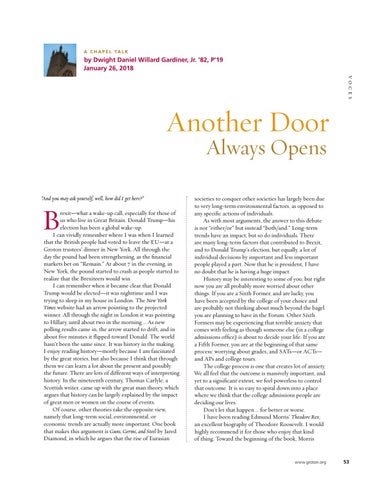A C H A P E L TA L K
by Dwight Daniel Willard Gardiner, Jr. ’82, P’19 January 26, 2018 voces
Another Door Always Opens
“And you may ask yourself, well, how did I get here?”
B
rexit—what a wake-up call, especially for those of us who live in Great Britain. Donald Trump—his election has been a global wake-up. I can vividly remember where I was when I learned that the British people had voted to leave the EU—at a Groton trustees’ dinner in New York. All through the day the pound had been strengthening, as the financial markets bet on “Remain.” At about 7 in the evening, in New York, the pound started to crash as people started to realize that the Brexiteers would win. I can remember when it became clear that Donald Trump would be elected—it was nighttime and I was trying to sleep in my house in London. The New York Times website had an arrow pointing to the projected winner. All through the night in London it was pointing to Hillary, until about two in the morning … As new polling results came in, the arrow started to drift, and in about five minutes it flipped toward Donald. The world hasn’t been the same since. It was history in the making. I enjoy reading history—mostly because I am fascinated by the great stories, but also because I think that through them we can learn a lot about the present and possibly the future. There are lots of different ways of interpreting history. In the nineteenth century, Thomas Carlyle, a Scottish writer, came up with the great man theory, which argues that history can be largely explained by the impact of great men or women on the course of events. Of course, other theories take the opposite view, namely that long-term social, environmental, or economic trends are actually more important. One book that makes this argument is Guns, Germs, and Steel by Jared Diamond, in which he argues that the rise of Eurasian
societies to conquer other societies has largely been due to very long-term environmental factors, as opposed to any specific actions of individuals. As with most arguments, the answer to this debate is not “either/or” but instead “both/and.” Long-term trends have an impact, but so do individuals. There are many long-term factors that contributed to Brexit, and to Donald Trump’s election, but equally, a lot of individual decisions by important and less important people played a part. Now that he is president, I have no doubt that he is having a huge impact. History may be interesting to some of you, but right now you are all probably more worried about other things. If you are a Sixth Former, and are lucky, you have been accepted by the college of your choice and are probably not thinking about much beyond the bagel you are planning to have in the Forum. Other Sixth Formers may be experiencing that terrible anxiety that comes with feeling as though someone else (in a college admissions office) is about to decide your life. If you are a Fifth Former, you are at the beginning of that same process: worrying about grades, and SATs—or ACTs— and APs and college tours. The college process is one that creates lot of anxiety. We all feel that the outcome is massively important, and yet to a significant extent, we feel powerless to control that outcome. It is so easy to spiral down into a place where we think that the college admissions people are deciding our lives. Don’t let that happen … for better or worse. I have been reading Edmund Morris’ Theodore Rex, an excellent biography of Theodore Roosevelt. I would highly recommend it for those who enjoy that kind of thing. Toward the beginning of the book, Morris
www.groton.org
53
